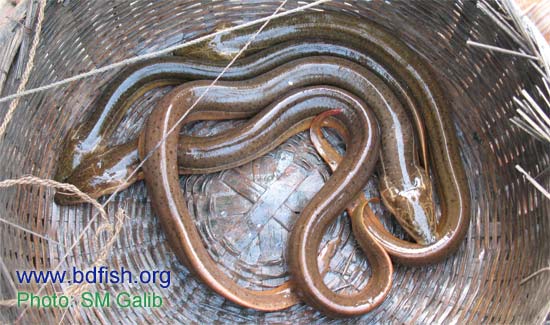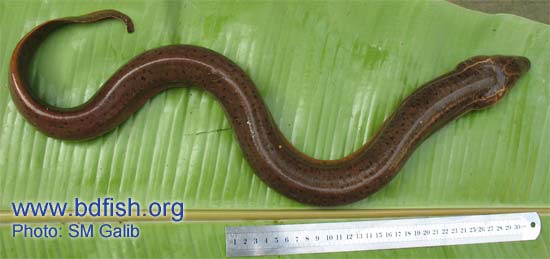
Systematic position
Phylum: Chordata
Class: Actinopterygii (Ray-finned fishes)
Order: Synbranchiformes (Swamp eels)
Suborder: Synbranchoidei
Family: Synbranchidae (Swamp eels)
Genus: Monopterus
Species: M. cuchia
Common/local names
English: Gangetic mud eel, Cuchia
Bangladesh: Kuchia (কুচিয়া), Kuicha (কুইচা) and Kunche (কানচি)
India: Kuchia (Assam); Kuchia, Cuchia, and Kunche (West Bengal); Anayabaam and Cuchia (Bihar) and Cuchia (Orissa) (Talwar and Jhingran, 1991)
Synonyms
Amphipnous cuchia (Hamilton, 1822)
Ophichthys punctatus Swainson, 1839
Pneumabranchus albinus McClelland, 1844
Pneumabranchus leprosus McClelland, 1844
Pneumabranchus striatus McClelland, 1844
Unibranchapertura cuchia Hamilton, 1822
Distributions: Bangladesh; India (northern and northeastern India), Pakistan, Nepal and Myanmar (Talwar and Jhingran, 1991).
Conservation status: Vulnerable in Bangladesh due to loss of habitats, changes in habitats and overexploitation (IUCN Bangladesh, 2000).
Morphology: Cylindrical body eel like not whip like. Eyes small, head not conspicuous, gill-opening crescentic of which gill greatly reduced. Large and paired suprabranchial pouch (respiratory organ) present. Only a rudimentary dorsal originates from anus vertically with no pectoral, pelvic, anal and caudal fin. Scales distinct and longitudinally arranged.
Body color greenish or a chest-nut brown, becoming lighter on abdomen with numerous black spot on body (Talwar and Jhingran, 1991).

Fin formula: D. very rudimentary; P1. P2. A. and C. absent (Bhuiyan, 1964; Rahman, 1989 and 2005; IUCN Bangladesh, 2000).
Maximum lengths: 20 cm (Bhuiyan, 1964), 66 cm (Rahman, 1989 and 2005) and 60 cm (Talwar and Jhingran, 1991; IUCN Bangladesh, 2000) and 82 cm (Galib, 2008).
Habitats: Freshwater and brackishwater fish; found in shallow, well vegetated waters and mud (IUCN Bangladesh, 2000). Inhabits plenty in mud holes in shallow beels and boro paddy field throughout the Bangladesh (especially Sylhet, Mymensingh and Tangail districts) (Rahman, 1989 and 2005). Inhibits muddy hole of rivers and paddy fields (Bhuiyan, 1964). Recorded from Chalan beel (Galib et al., 2009).
Fishery info: Used as food fish in Bangladesh but many people do not take it as food. Believed to have medicinal value.
__________________________________________________________
REFERENCES
Bhuiyan AL (1964) Fishes of Dacca, Asiat. Soc. Pakistan, Pub. 1, No. 13, Dacca, pp. 97-98.
Galib SM. 2008. A Study on Fish Diversity and Fishing Gears of Chalan Beel with Reference to Preservation of Catches, Honors dissertation submitted to the Department of Fisheries, University of Rajshahi, Bangladesh, 172 pp.
Galib SM, Samad MA, Mohsin ABM, Flowra FA and Alam MT (2009) Present Status of Fishes in the Chalan Beel- the Largest Beel (Wetland) of Bangladesh, Int. J. Ani. Fish. Sci. 2(3):214-218.
Hamilton F (1822) An account of the fishes found in the river Ganges and its branches. Edinburgh & London. An account of the fishes found in the river Ganges and its branches.: i-vii + 1-405, Pls. 1-39.
IUCN Bangladesh (2000) Red book of threatened fishes of Bangladesh, IUCN- The world conservation union. xii+116 pp.
McClelland J (1844) Apodal fishes of Bengal. Calcutta Journal of Natural History 5(18):151-226, Pls. 5-14.
Rahman AKA (1989) Freshwater Fishes of Bangladesh, 1st edition, Zoological Society of Bangladesh, Department of Zoology, University of Dhaka, Dhaka-1000, pp. 50-51.
Rahman AKA (2005) Freshwater Fishes of Bangladesh, 2nd edition, Zoological Society of Bangladesh, Department of Zoology, University of Dhaka, Dhaka-1000, pp. 65-66.
Swainson W (1839) The natural history and classification of fishes, amphibians, & reptiles, or monocardian animals. Spottiswoode & Co., London. Nat. Hist. & Class. i-vi + 1-448.
Talwar PK and Jhingran AG (1991) Inland Fishes of India and Adjacent Countries, Vol. 2, Oxford & IBH Publishing Co. Pvt. Ltd. New Delhi-Calcutta, pp. 776-777.
Visited 24,673 times, 1 visits today | Have any fisheries relevant question?
